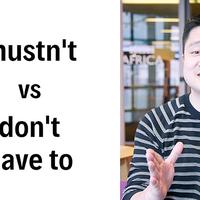Mustn't vs Don't have to - English In A Minute - YouTube
يجب ألا|||||||||
não deve|||||||||
Mustn't vs Don't have - English In A Minute - YouTube
Mustn't vs Don't have to - English In A Minute - YouTube
Mustn't vs Don't have to - Inglese in un minuto - YouTube
Mustn't vs Don't have to - Angielski w minutę - YouTube
Mustn't vs Don't have to - Inglês num minuto - YouTube
Mustn't vs Don't have to - English In A Minute - YouTube
Mustn't vs Don't have to - Bir Dakikada İngilizce - YouTube
Mustn't vs Don't have to - English In A Minute - YouTube
不得与不必 - 一分钟英语 - YouTube
不得與不必 - 一分鍾英語 - YouTube
Hi guys! This is Kee from BBC Learning English.
|các bạn|||||||
Hallo Leute! Das ist Kee von BBC Learning English.
Merhaba millet! Ben BBC Learning English'ten Kee.
Today, I'm going to tell you the differences
Heute erkläre ich euch die Unterschiede
Bugün size farkları anlatacağım.
between mustn't and don't have to.
zwischen dürfen und müssen nicht.
yapmamalı ve yapmamalı arasında.
Now, must and have to are similar in meaning.
Nun, must und have to haben eine ähnliche Bedeutung.
Şimdi, must ve have to anlam bakımından benzerdir.
They are both used to describe obligations.
Sie werden beide verwendet, um Verpflichtungen zu beschreiben.
Her ikisi de yükümlülükleri tanımlamak için kullanılır.
However, their negative forms
Allerdings ihre negativen Formen
Ancak olumsuz biçimleri
Tuy nhiên, các hình thức phủ định của chúng
are completely different in meaning.
|совершенно|||
haben eine völlig andere Bedeutung.
anlam bakımından tamamen farklıdır.
hoàn toàn khác nhau về nghĩa.
We still use mustn't to talk about obligations.
Wir verwenden immer noch Must't, um über Verpflichtungen zu sprechen.
Hala zorunluluklardan bahsetmek için mustn't kullanıyoruz.
Chúng ta vẫn sử dụng mustn't để nói về nghĩa vụ.
For example:
Zum Beispiel:
Örneğin:
In the house, I mustn't wear shoes.
в||||||
|||||đi|
Im Haus darf ich keine Schuhe tragen.
В доме я не должен носить обувь.
Trong nhà, tôi không được mang giày.
You know, to keep the house clean.
Sie wissen schon, um das Haus sauber zu halten.
Знаешь, чтобы поддерживать дом в чистоте.
Bilirsin, evi temiz tutmak için.
Bạn biết đấy, để giữ cho ngôi nhà sạch sẽ.
But don't have to does not describe obligations,
Aber nicht müssen beschreibt keine Pflichten,
しかし、その必要はない、
Но "не обязательно" не описывает обязательства,
Ancak zorunlulukları tarif etmek zorunda değilsiniz,
Nhưng không phải lúc nào cũng không mô tả nghĩa vụ.
so the choice is yours!
||выбор||
Sie haben also die Wahl!
だから、選択はあなた次第だ!
Yani, seçim senin!
vì vậy lựa chọn là của bạn!
For example, if your teacher said:
Wenn dein Lehrer zum Beispiel gesagt hat:
例えば、先生がこう言ったとする:
Ví dụ, nếu giáo viên của bạn nói:
you don't have to do your homework,
ты||||||
||||||bài tập về nhà
Du musst deine Hausaufgaben nicht machen,
bạn không phải làm bài tập về nhà,
well... then choice is yours.
||выбор||
||||yours
naja...dann hast du die wahl.
まあ...それなら選択はあなた次第だ。
peki... o zaman seçim senin.
thì... sự lựa chọn là của bạn.
You can say:
Sie können sagen:
Söyleyebilirsin:
Bạn có thể nói:
Alright, I won't!
||không
Okay, werde ich nicht!
わかった!
알았어요, 안 할게요!
Tamam, yapmayacağım!
Được rồi, tôi sẽ không!

